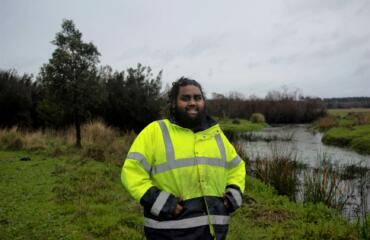It hasn’t always been easy for Professor David Karoly, one of the world’s leading climate scientists, to stick his head above the parapet.
An introvert by nature, a characteristic Karoly observes is true for many scientists, he once hated public speaking. But given his expertise and the urgency of a warming planet, a quiet life was not an option. It was during his time as leader of the Cooperative Research Centre for Southern Hemisphere Meteorology at Monash University, from 1995 to 2000, that he realised sharing his work only with other scientists “wasn’t going to have an impact”.
In the decades since, he’s become a familiar voice, animated yet measured, in the often-shrill clashes that for years dominated Australia’s climate debate. Improving public understanding of climate science has become one of the defining legacies of his career.
In recent years, however, having moved from the university sector into a senior role with the Commonwealth Scientific and Industrial Research Organisation, he’s chafed under the constraints placed on what scientists can say publicly about federal government policy and its implications for the climate crisis.
So, as Karoly retires this week as head of CSIRO’s Earth Systems and Climate Change Hub to return to the University of Melbourne as an honorary professor, he’s got a rather a lot to say.
“[CSIRO] wanted me to become what they call a post-retirement fellow and to continue on, but in some sense, the reason they wanted to do that was to continue to keep their thumb on me to control me,” he tells The Citizen.
Asked if he believes the limits on public commentary from government scientists is damaging the Australian public’s understanding of the climate crisis, Karoly is blunt: “Yes, it clearly is.
“It seems stupid to me that we have some of the country’s best climate scientists in the Bureau of Meterology and in the CSIRO, and they are limited in providing the latest climate change science to community groups or business and industries, in the sense they can’t talk about links between science and public policy,” Karoly says.
“And, in particular, they’re not allowed to talk about the links between the latest science and Australia’s greenhouse gas emission reduction targets.
“To me, that is ultimately damaging because that’s where, in some sense, the rubber hits the road and doesn’t hit the road in Australia at present.”

Flashback 2016: CSIRO fellow and oceanography researcher John Church (second right) and atmospheric science professor David Karoly (right) speak out against job cuts at the CSIRO, which scientists argued would directly undermine Australia’s obligations under the Paris climate commitments. (AAP Image/Luke Costin)
Karoly’s determination over his career to inform and warn about the potentially catastrophic implications of the climate crisis is credited with pushing the “Overton window” – that is, the realm of what is politically acceptable at a given time – towards greater recognition of science in climate policy making. Joseph P. Overton was an American analyst who argued an idea’s political viability depended on whether it fell within the range of policies that a politician could recommend without appearing too extreme.
The legacy of his work to elevate recognition of science in Australia and more widely was a dominant theme of presentations at a retirement symposium hosted by CSIRO last week celebrating Karoly’s achievements. Climate researchers who’ve worked closely with Karoly during his 45-year career praised his work, his “indefatigable cheerfulness in the face of such dire findings” and “infectious passion” to an online audience of almost 300 people.
“David frequently tested the boundaries… and in a manner that we all benefited from. Ultimately, he helped drag this [Overton] window in Australia to a place where science communication wasn’t continually compromised. And where scientists had more influence,” said Dr Karl Barganza, manager of climate monitoring at the Australian Bureau of Meteorology, and one of 46 master’s and PhD students Karoly supervised during his career.
“He led the way for all of us on that front.”
The enduring influence Karoly has left on the ranks of science and his staunch support for early-career scientists, particularly for women, was spotlighted during a speech given by Dr Joëlle Gergis, an award-winning climate scientist and lead author in the latest Intergovernmental Panel on Climate Change 6th Assessment Report. She told the symposium how at one point she was feeling discouraged in her career while trying to secure funding to pursue critical research into the long-term context of drought in Australia.
Gergis was put in touch with Karoly, who within 10 minutes of meeting offered to fund the proposal for her research. She now credits Karoly for restoring her sense of faith in herself as a researcher, and as being the “crucial missing link” that “unlocked the potential” of her career. Gergis’ drought research produced her 2018 book Sunburnt Country.
Plowing the way for wider recognition of climate science in Australia was challenging in unexpected ways. In 2007, during what Karoly describes as “the worst period of climate change denial in Australia”, he received repeated death threats from anti-scientist extremists.
For his safety, the University of Melbourne advised him to alter his route to work. His room number was removed from the University’s website. His name was removed from the door to the school’s office.
“What did it mean to me? I treated it as a way that it meant that I had to work harder to communicate my climate change science. It did not detract from what I was doing at all,” he tells The Citizen.

Professor Karoly addressing a school in Georgia, US, via Zoom in 2020. One of the hopeful developments on climate, he argues, is the determination of young people to achieve stronger action. Photo: Supplied
In a move that shocked colleagues, Karoly left the university sector in 2018 to take up the role of head of CSIRO’s Earth Systems and Climate Change Hub. Climate scientists within the organisation were feeling besieged as a consequence of several years of savage budget cuts and job losses, notably from 2013 under the Abbott government. Karoly saw an opportunity to use his experience and profile to defend climate research programs and capacity.
“The federal government likely was going to close [the CSIRO’s Earth Systems and Climate Change Hub] down, but I saw it was critical to try to make it successful. And at the end in 2021, everyone agreed that it had been a great success, primarily due to my efforts in turning around what was happening,” Karoly says.
While the move cost him some of his public voice, Karoly is proud of his achievements inside CSIRO. He points to a 50 per cent funding increase secured for the climate hub over the next seven years.
As he scales back his own work, Karoly says there’s still much to be done to avoid the worst impacts of the climate crisis. In Australia and globally, emission reduction schemes are not enough, he says, with the world currently on path to shoot through 1.5 degrees of warming above pre-industrial levels.
But he also emphasises hopeful developments: the technology we need for rapid emission reductions exists, and the next generation of Australians, for many of whom science-based climate policy is a no-brainer, are becoming louder in their demand for stronger action.
“They are a critically important group, and their actions and what they want to do is key for what happens over the next five, 10 years and beyond.”





